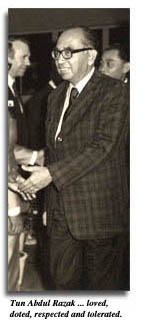|
|
|
 |

 |
30 March 1997
On Tuesday 11 March Tun Abdul Razak bin Hussein would have been 75 years old. He
would not be able to speak anymore, but what stories he could tell! Now it remains
for others to tell them, and they haven't done that; no they have not. In a book
(tentatively) titled The Politics of a Thinking Realist: Tun Razak -1922-1976.
I will tell all the stories.
It will be a most candid book because the second Prime Minister was a great and wonderful
man as well as great fun to work with. Ours was a 14-year-old close collaboration.
I wrote this article on March 11 on purpose: to commemorate the 21st anniversary
of his sudden death in London of leukemia on Jan 14, 1976 which stunned and saddened
all Malaysians.
One of me most moving obituaries, certainly the most personal and poignant as far
as I was concerned was written by a "colleague" which was published in
the New Straits Times soon after the state funeral. That eulogy was
the finale during the sad January week.

People have over the years asked me who was the colleague. I am more than bewildered.
It has become a bit of nuisance actually since I was not the editor of the newspaper
which published the obituary. Why should I know who penned it?
The flatterers said it must have been me; several with good reason thought it was
me. It could well have been me but, alas, it wasn't me. However, after 21 years I
think I can reveal the identity of the obituary writer. After reading the many obituaries
I discovered none was written by someone who not only admired Abdul Razak but also
a member of his "inner political circle" and whom the departed leader respected.
I know who Abdul Razak was overfond of, loved, doted, liked, respected and tolerated,
and the few he was wary of, to put it mildly. I discussed with the candidate among
Abdui Razak's acolytes I thought should have the honour to craft the obituary. We
agreed he would write it anonymously: no byline.
A day or two passed he sent me by despatch what he had written. I immediately rang
him to say it was very good, and passed on the obituary to Tan Sri Lee Siew Yee,
the editor-in-chief of the New Straits Times, simultaneously also informing
Samad Ismail, (now also a Tan Sri) Lee's deputy, with a request to use it.
I distinctly recall both asked who wrote it. Told them and they were hardly unsurprised.
It was Samad who suggested it should be attributed to someone. There and then I told
him to credit it to a "colleague." The person, I know for sure, could write
and there were very few indeed among the oligarchy at that point of time who could
write in English well, and fast. It is bad news but it is true.
I took upon myself to persuade him to wind up the sad episode, apart from the reason
noted, because it was important that Abdul Razak's achievements and failures should
not be distorted that the perspective of Abdul Razak's years would be seen by historians
as a crucial period when reorientation and realignment in politics, economy, multi
culturalism and racial harmony were taken further and entrenched.
|

|
|
|
|